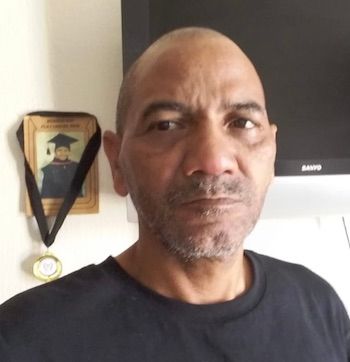Abie Issacs

Summary: Abie Isaacs, who began his activism in the fight against apartheid, today is a leader in the fight against gangsterism, drug trafficking, and hijacking in the Cape Flats, a Cape Town community rocked by violence. Isaacs, a former trade unionist, founded the Cape Flats Safety Forum in 2014 to nurture a generation of progressive young people and to establish a peaceful community by fighting gangsterism and the proliferation of drugs. His work is dangerous but Isaacs is determined to continue his efforts.
Profile: When Abie Issacs arrived in South Africa’s Cape Flats in 1976, he found a divided community and realised that “poverty had been the key driver to most social ills that rocked the community.”
During apartheid in the late 1970s, Isaacs was a high school student who distributed fliers condemning the racial rule of the then-apartheid government. The regime swiftly responded: His family house was raided.
“When the police arrived after I was suspected of distributing pamphlets,” said Isaacs, “I was not at home. But both my father and my mother were harassed.”
In 1987, after having seen the exploitation of the workers in the telecommunication industry, Isaacs became a shop steward. His duties were to educate workers about their rights and to represent members at the negotiating table. Although his employer tried to bribe Isaacs by offering him a post to join the management team, he refused
In 2014, following increased cases of gangsterism, drug trafficking, gender-based violence, hijackings, and kidnappings, Isaacs led community members in forming the Cape Flats Safety Forum. His vision was a society free from crime, “where community members feel safe and children can play without fear”.
Noting that young people were easy targets for gangsterism, Isaacs and his colleagues launched a campaign that took youths leaning toward crime to correctional services in the Western Cape. The goal was for them “to learn and see what happens if one is in conflict with the law. We have thus far taken 60 youth.”
Isaacs’ service doesn’t stop there. At a time when the rate of child kidnapping is high in South Africa, Isaacs also mobilises his community to search for lost children. As a result, they have reunited about a dozen children with their families. He also supports Community Policing Forums, neighbourhood watch committees, and underground intelligence work with the South African Police Service.
Isaacs is a full-time technician at a local telecommunications company that manufactures safety devices such as CCTV cameras; all his activism is voluntary. He uses his personal money to finance organisational activities. As he says, “Our organisation is currently running on contributions from well-wishers. We don't get any funding from any institution. I have made some personal and financial sacrifices to ensure the organisation reaches its objectives. From time to time, I use my personal salary and donate to the organisation. . . . For me, it's about passion. I have to serve my community.”
His service is sometimes dangerous: “I personally have faced many risks in this environment. Just two weeks ago, as I was attending community work, there was a shooting on my road. The gunslinger ran past me and fired at his enemy.” Though the bullets missed Isaacs, the psychological consequences cannot be ruled out. Stories of community activists being killed or losing their loved ones are not uncommon in South Africa. In spite of these challenges, Isaacs vows to continue working for the restoration of peace in his community.
As he says, “If we as a community and leadership can work together to eradicate crime and other social ills, we would be able to turn the negative face of the Cape Flats to a positive face. We need to steer our youth in the right direction."
